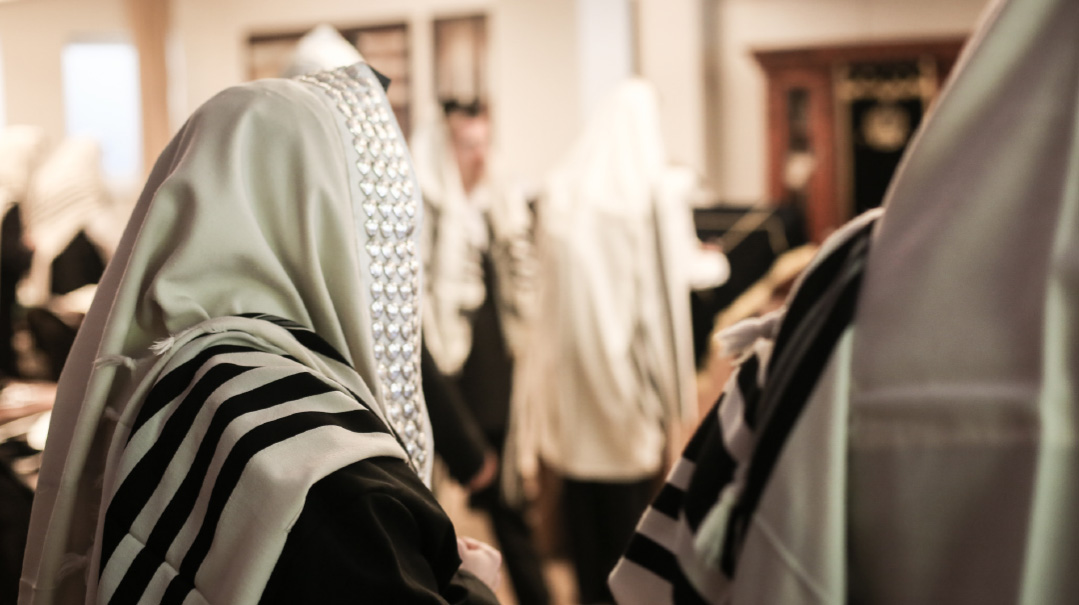Following the Lead of Our Righteous Women

They would not settle for anything less than the best, so we, too, will do our best
Few things arouse childhood memories like Pesach. For some, it might be the Sedorim stretching into the wee hours of the night, for others it’s the memory of standing on a chair and reciting the Mah Nishtanah to the cheers of the adoring adults. And for others, the Yom Tov itself may not leave as deep an impression as the frenzied preparations that lead up to it, which makes one wonder — if Pesach didn’t fall on a definitive date, would we be doomed to prepare for it forever?
Personally, and gratefully, I have fond recollections of all of these, and then some.
But nothing is seared in my memory like the awe and reverence my mother a”h displayed toward the Torah’s prohibitions against chometz and anything remotely chometz-related. As the youngest of four brothers, I vividly recall the bein hazmanims when we were home and left with specific instructions about what needed to be done during the day while our mother was at work. “The Box” on the kitchen table (as well as Mrs. Rothstein’s leftover shaloch manos cake) held everything that was supposed to sustain us through the hungry days leading up to Yom Tov, when we would finally get to indulge in ladyfingers and matzah with butter.
One of my older brothers appointed himself foreman and doled out jobs to everyone else. I had the privilege of cleaning the grout in the bathroom tiles, all the while wondering what chometz could possibly be found there. It was a mystery to me, but I did as I was told. Later that day, I was caught noshing on a freeze pop within ten feet of the sealed boxes of wine (who cares if it was only kitniyos, and a full week before Pesach) and was duly “busted” for undermining the entire kashrus of the house. In my youthful naïveté, I figured it was a Plotnik thing, and nobody else could possibly approach Pesach the same way. Was I mistaken!
Now that I am an adult and have seen the rest of the world a little more, I can honestly affirm that this seriousness with which the threat of chometz contamination was taken is the norm, not the exception. Our nashim tzidkaniyos have ruled the roost ever since Pesach Mitzrayim. In fact, the Gemara informs us, it was in their merit that we were redeemed from Mitzrayim in the first place, and as a result they are obligated to celebrate with arba kosos of wine just like the men.
What did these nashim tzidkaniyos actually do? And is there a connection between their deserved reputation for being the chometz taskmistresses that they are and the righteousness they displayed in Mitzrayim?
Let us see what Chazal taught us and get a greater appreciation of what they did to pave the road to geulah. The Gemara relates that while the men in Mitzrayim were out performing back-breaking work in the fields, the women would fill up buckets of water, snaring some fish in the process, and prepare a hearty meal for their husbands. They would then give them the water to wash themselves up, and would enable them to perpetuate the nation of Israel.
What are Chazal telling us here? Certainly not that our ancestors in Mitzrayim were responsible for our love of herring or sushi, and that is what stood as a merit for geulah. The message may be as follows. We are told by the Rambam in the first chapter of Hilchos Avodah Zarah that our adherence to the laws of the Torah did not begin at Har Sinai; the Avos had already practiced many of them and no doubt taught them to their offspring as well. The Torah restricts the foods we may consume, and as we know from Chazal, eating the forbidden foods causes timtum halev, an inability to commit ourselves properly to avodas Hashem and limud haTorah.
Basic halachah certainly allows us under circumstances of pikuach nefesh to eat whatever is available. The men in Mitzrayim could certainly have allowed themselves to eat whatever fare their taskmasters gave them, even despicable items such as shkatzim (bugs) and the like, which were staples of Egyptian cuisine. In fact, Rashi at the end of parshas Shemini tells us, based on the Gemara, that it was worth leaving Mitzrayim for that reason alone.
Perhaps it is based on this concept of timtum halev and the irreversible spiritual damage the consumption of shkatzim causes that made our release from Mitzrayim that much more significant. (See Sfas Emes and Divrei Yoel at the end of parshas Shemini for an elaboration of this concept.) Had we not been liberated from the impurity of Mitzrayim, we could have never received the Torah and learned it b’chol levavecha. Our hearts would have been too tainted. So even if we had been permitted to partake of whatever the Egyptians served us, the women wouldn’t have any part of it. Their husbands were not going to live a life of bedieved, and if it was possible to provide them with kosher fish, they would be moser nefesh to obtain it. This was the hallmark of the nashim tzidkaniyos of Mitzrayim, and this would become their legacy. It is the best or bust.
Let us return our attention to the end of the above-mentioned Gemara and the merit of the nashim tzidkaniyos. As noted, the women used the fish-laden water they drew to enable their husbands to sustain their hygiene and wash themselves, certainly a great relief from their avodas parech. What lesson are Chazal teaching us here?
Perhaps we can shed light on this with an anecdote shared by the renowned maggid Rav Yaakov Galinsky ztz”l. While incarcerated in Siberia during World War II, the young Yankel Galinsky noticed that in the middle of the night, one of his fellow bunkmates pulled a uniform out of a bag, donned it, and briefly admired himself in it, before quickly changing back into his threadbare gulag outfit. This became a nightly ritual.
His curiosity getting the better of him, Yaakov approached the man and asked him what this was all about. The gentleman responded that he had previously been a high-ranking officer in the Polish army, and would not allow himself to forget who he really was, despite the Russians’ attempt to make him feel like a lowly prisoner. By putting on his uniform every night, he reminded himself.
Perhaps this was the intent of our heroines in Mitzrayim as well. The women fully believed that geulah was just around the corner, and wanted to ensure that their husbands maintained their sense of dignity, even under the miserable conditions forced upon them by Pharaoh. After all, once geulah arrived, we would be expected to rule as the kings and princes of the world, just as the navi Yeshayahu describes the future geulah — “V’hayu melachim omnayich,” former kings will be your subjects. The women would not let us forget who we were then, the children of Avraham, Yitzchak, and Yaakov, nor what we will soon be once again, geulim. They did their best by providing the men with whatever they could to maintain that self-respect and appreciation for who they truly were. We cannot be geulim if we feel like slaves. And the nashim tzidkaniyos ensured we would not.
This is what we needed to merit geulah. After all, do we really need to live a life of geulah to fulfill Torah and mitzvos? Have we not been living, and sometimes even thriving, in galus, for thousands of years? Sure we have, but that is bedieved living. We have no korbanos, no Beis Hamikdash, and our closeness to Hashem is severely impaired. If we truly want to merit a life of l’chatchilah, we must show our willingness and resolve to live that way, even in galus. And this is precisely what those righteous women were modeling for the rest of us, and because of that we all merited geulah.
A staple vort of our Seder is a commentary of the Sfas Emes on why we are so particular to wash our hands for the wet vegetable of karpas, a practice we do not follow the rest of the year. He explains that we find from among all the various korbanos, only the Korban Pesach and Korban Chatas are disqualified if they are not offered lishmah, with the specific intent for which they were brought. This is because both of these offerings represent new beginnings; for a sinner, the Chatas represents the beginning of a new life as a baal teshuvah, and the Pesach represents our beginning as a nation.
Foundations must be perfect. One cannot build a skyscraper on mud and unstable earth; it will collapse. Expectant mothers are so meticulous with what they ingest or expose themselves to while their babies are forming in utero. If the foundation is flawed, the damage can be irreversible. So, too, Pesach night represents the foundation of Am Yisrael, and therefore everything about it must be perfect. This entails being particular about things we would otherwise ignore the rest of the year and the myriad chumros for which Pesach is famous. We wash for karpas. Chometz cannot become batel (nullified) once Pesach arrives, unlike other forbidden mixtures. And the list goes on and on.
The Rema in Hilchos Pesach admonishes those who would belittle the women who scrub their walls before Pesach, and other such customs. There were even those who would repaint their kitchen walls every Pesach out of fear of chometz making an unwelcome appearance. The Chasam Sofer reportedly instructed his townsfolk to prepare the nochri who ground the borscht for Pesach by buying him new clothing and taking him to the river to cleanse himself before he lay a finger on any food for Yom Tov.
To the uninitiated this sounds extreme, but for us it is the inheritance of our nashim tzidkaniyos.
Rabbi Mordechai Shapiro ztz”l, a close talmid of Rav Aharon Kotler ztz”l, was afforded close access to Rav Aharon’s father-in-law, Rav Isser Zalman Meltzer ztz”l, when he was learning in Eretz Yisrael. Rav Shapiro related the following incident that he personally witnessed in Rav Isser Zalman’s home. The Rebbetzin Baila Hinda related that she was traveling by rail when she was 16, and became aware that the great tzaddik Rav Mordechai Rosenblatt was on the same train. Not wanting to squander the opportunity, she approached him for a brachah that she merit to marry a gadol hador.
The rav was none too happy with such a request and sent the young woman away with an admonishment for being conceited. Understandably, the mussar left young Baila Hinda in tears. Shortly thereafter, she was summoned to return to Rav Rosenblatt. In a gentler tone he told the young woman, “If you are misga’eh (haughty) in matters of Torah, that is not ga’avah.” The Rav indeed blessed her.
And sure enough, she went on to marry the incomparable Rav Isser Zalman, and bear the daughter who would eventually marry Rav Aharon Kotler. The Rebbetzin shared this anecdote in the presence of her esteemed husband, who then commented, in his trademark humility, “Rav Rosenblatt was a great man — why didn’t his brachah come true?”
What the Rebbetzin was demonstrating was this middah of the nashim tzidkaniyos before her. The Gemara tells us of Chana, the previously barren mother of Shmuel Hanavi, who begged Hashem for a child equal to Moshe and Aharon, and was answered in kind. Why was she insisting on that? Should she not be satisfied with any child at all, even if he wasn’t the great and holy Shmuel?
The answer is that Chana knew who she was and what she was capable of. If I can raise the best, I want the best! Hashem saw her conviction and commitment, and many Jewish women for generations recite her tefillah every Leil Shabbos when they light their candles and daven for their children.
Let us take our lead from these nashim tzidkaniyos and ask ourselves some hard questions. Are we doing our best in our commitment to bein adam l’Makom, as well as in bein adam l’chaveiro, or are we just getting by bedieved? When we greet our spouses, friends, and neighbors, is the “Hello, how are you?” merely perfunctory, or is it said with sincerity and a smile? Do we fulfill Chazal’s dictum of “hamlachta es chavercha” — do we make our friends feel noble, or are they made to feel like an annoyance when they call on the phone? If we can’t recall whether we made a brachah, does that not imply that even if we had, it was not made properly in any event, since otherwise its impression would be hard to forget?
And the list goes on.
This is the legacy of the nashim tzidkaniyos and their lesson to all of Klal Yisrael. They would not settle for anything less than the best, so we, too, will do our best. Whether it be the scrubbing of the walls, or the washing for karpas at the Seder, or taking the nochri to the river, that is the foundation we are building every Pesach as we relive the night of our geulah. And if we do it right and try our best, we can be zocheh once again in the merit of, and through the example of, our nashim tzidkaniyos to walk to geulah once again, bimheirah b’yameinu.
Rabbi Plotnik, a talmid of the yeshivos of Philadelphia and Ponovezh, has been active in rabbanus and chinuch for 25 years and currently serves as ram in Yeshivas Me’or HaTorah in Chicago.
(Originally featured in Mishpacha, Issue 906)
Oops! We could not locate your form.







